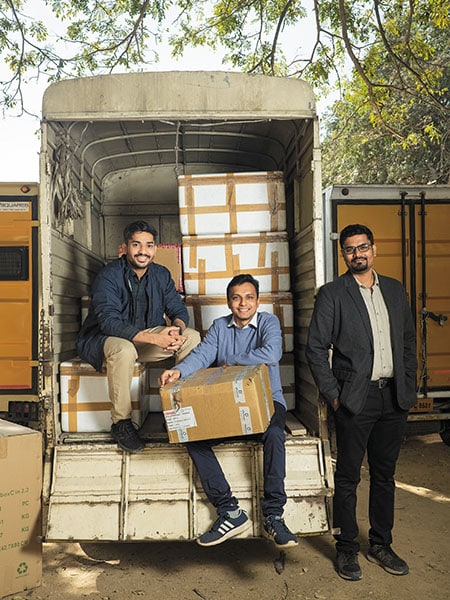
Pranav Goel, Uttam Digga, Vikas Chaudhary: On the right truck
 From left: Vikas Choudhary, Pranav Goel and Uttam Digga, co-founders of Porter, are trying to transform the supply chain economy
From left: Vikas Choudhary, Pranav Goel and Uttam Digga, co-founders of Porter, are trying to transform the supply chain economyImage: Nishant Ratnakar for Forbes India
Pranav Goel | 29
Uttam Digga | 29
Vikas Chaudhary | 28
Co-founders, Resfeber Labs & Porter
Category: Technology
Last February, Mahindra Group struck an agreement to merge SmartShift, its logistics solutions unit, with Porter. Mahindra would also invest ₹65 crore in the merged entity to become a significant minority shareholder in the venture. The deal is expected to conclude in the next few months. Porter is an online logistics marketplace started in 2014 by IIT graduates Pranav Goel, 29, Uttam Digga, 29, and Vikas Chaudhary, 28, under their company Resfeber Labs. It helps small businesses and individuals find light commercial trucks on demand, especially for intra-city needs.
With the consolidation of SmartShift and backing from the $19-billion Mahindra Group, the highly tech-enabled Porter is likely to build on its promise. It helps that Resfeber Labs counts Sequoia Capital and Kae Capital as its investors.
“We are not only trying to transform the supply chain economy, but also [working on] the social transformation of our drivers,” says Goel. “With India’s smartphone revolution, we can expose them to a host of services such as better access to health care.”
Click here for 30 Under 30 2019 list
“Our association with Porter will be a win-win for both companies and cement our position in the ever-growing shared mobility space,” says Anish Shah, chairman of SmartShift.
Porter currently operates in Bengaluru, Hyderabad, Chennai, Mumbai and Delhi-NCR. It has over 50,000 monthly active customers and more than 10,000 drivers active on its network. The company has completed in excess of 3 million bookings to date.
As platforms such as Porter grow—its founders aspire to touch 15 cities—an Uber-like service is also a possibility, with truckers almost always expecting to find return loads. This would help save the nation fossil fuel, and make transportation that much more sustainable and planet friendly.

(This story appears in the 30 November, -0001 issue of Forbes India. To visit our Archives, click here.)
X





